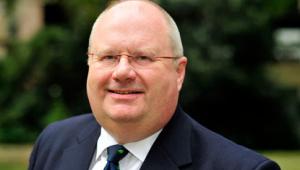By Richard Johnstone | 26 October 2012
Further changes could be made to the coalition’s town hall finance reforms after local government minister Brandon Lewis revealed he is examining calls to alter business rates localisation to ensure cities are not disadvantaged.

In an exclusive interview with Public Finance, Lewis also discussed the government’s concerns over some local authorities’ plans to impose council tax hikes on their poorest working-age residents.
On business rates, Lewis said proposals put forward by a London borough to ensure urban areas benefit from growth were ‘interesting’. Authorities will retain half of the growth in business rates in their area from next April under plans to encourage councils to back new developments for business growth.
However, Westminster City Council has told ministers the plan could leave authorities in built-up areas – with little room for new commercial properties on which rates are paid – with no incentive.
Council leader Philippa Roe told PF the authority was in ‘very, very early stage’ talks with government to create ‘local growth zones’ as part of the plans. These would devolve some of the ‘increased amount of tax that local businesses generate because they have been more successful’ back to the council, she added.
Lewis told PF the Department for Communities and Local Government was examining the proposal as part of responses to a consultation that closed on September 24, and would provide an update in November. Proposals for local growth zones contain ‘some interesting stuff’, he added.
‘What is very clear is that councils are responding positively to us devolving the interest in the local business community and the local commercial interest to local councils. That, in principle, they’re happy with. What we will look at with the consultation responses is to make sure we have a scheme that really does reinforce that,’ said Lewis.
The potential change comes after Lewis announced new transitional arrangements to localise the national Council Tax Benefit scheme to town halls.
Councils will take responsibility for allocating council tax support from next year following a 10% funding cut. Billing authorities – unitary and district councils in two-tier areas – are responsible for administering new schemes.
The government insists that councils continue to provide existing levels of benefit to pensioners, forcing authorities to design new eligibility criteria for working-age people. Some councils had been preparing to charge those who received 100% relief under the national scheme as much as 25% of their liability.
However, Lewis revealed on October 16 that councils will be able to bid for a share of a one-year £100m ‘transition grant’ if they capped liabilities for those who previously paid nothing at 8.5%. Grant applications will be made from January 31 next year, with money paid in March.
Lewis told PF that some proposed tax demands were ‘not acceptable’ to government, and some councils ‘need to look again’ at their plans. ‘Be very clear: some of the schemes that have come out do not protect the most vulnerable, and that’s not acceptable,’ he said.
‘There’s a few schemes that are all about just charging people money and cutting the benefit. Some are not looking at how they create economic growth and help people back into work.’
However, the funding announcement creates a ‘problem’ for authorities as they begin setting their budgets for 2013/14, a senior council figure has warned.
Peter Fleming, lead member for welfare reform at the District Councils' Network, said a ‘majority’ of authorities had been consulting for charges above 8.5%.
Fleming, who is also the leader of Sevenoaks District Council, said his authority’s plan – which had been developed with the backing of Kent County Council – was now ‘up in the air’. There was ‘no real detail’ about how the £100m will be split, he said.
‘There has been a mild change of heart by the government, but no detail – and until they account for how the scheme [will work], it is difficult,’ Fleming added.
‘Councils need to have this funding in their budget plans, but we can’t apply for money before January 31. That’s a bit of a problem if an authority doesn’t then get the money they thought they would.’
The government’s attempt to limit liabilities followed concerns that ‘this could be another “poll tax”, with lots of bills going out and not getting paid’, he said.
‘My response to that is they should have consulted properly on the plan before they introduced it. It does look a bit like the poll tax – asking people who haven’t paid to pay a little bit of money.’
Despite the extra funds, the question of ‘what do we do if they don’t pay’ remains, he added. ‘Authorities are not in a position to write that off.’






















